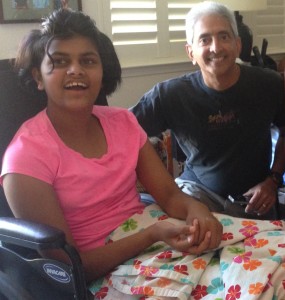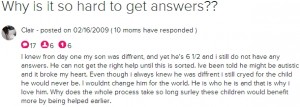How did your life change when you had a disabled child?
The following is a response I entered to the above question on Quora.com.
 Although having a disabled child meant total and absolute upheaval of life in our household, there are many variables. Another family’s experience is likely to be different.
Although having a disabled child meant total and absolute upheaval of life in our household, there are many variables. Another family’s experience is likely to be different.
Obviously, one important set of variables is the nature and severity of the disability. A child who needs only a little speech therapy, for example, or who simply needs a little extra time and concentration to complete tasks, is not likely to change things as drastically as one with acute issues. Granted, concerned parents are going to divert some degree of attention from other matters, regardless of the challenge.
The way the parents show concern is another key variable, and this holds true even in families where the kids aren’t disabled at all. For example, thinking back to life as a young married adult, I recall most of our friends had kids before we did. When we hosted parties, they showed up, toddlers in tow, and partied with us into the night. When the kiddos crashed, they flopped anywhere and the revelry carried on around them. Those seemed to be low-maintenance kids, and my impression was that their arrival in the world had not greatly complicated life for their parents. On the other hand, all of us today are familiar with the concept of the helicopter parent—the parent who finds bandwidth to micromanage every aspect of a growing child’s life. For them, parenthood surely brings big changes, although it’s their own choice.
The same dynamic applies in disability. In my book I describe parents of severely disabled kids who did advocate for their kids and certainly wanted the best for them, but who had quickly accepted the disability as a fact of life. I remember a father saying being unable to talk/walk didn’t matter, as long as his child knew he was loved. Another parent perceiving it as a problem that couldn’t be fixed admitted to dealing with the frustration by unloading on her kid—blaming him for ruining her life. (She claimed it didn’t do any harm since he was nonverbal.) Then there were parents like my wife and me who refused to accept that our son’s disability couldn’t be overcome. Yes, we conveyed our love to him, but in our view that love required us to do something extra.
Because our son’s problems were pervasive and rather profound, we had a mammoth task before us. But we chose to dedicate our lives to the campaign. She quit her job. I gave up opportunities for advancement. We focused on trying to understand the problem, and abandoned every doctor, therapist, or educator who didn’t contribute to the program. We stopped taking vacations, gave up on friends who didn’t see things our way, and, having selected a treatment strategy, lived and breathed it for the next four years. Our son achieved some important victories, which improved his quality of life, and those victories encouraged us to keep going. But ultimately, he did remain disabled. Our ultimate problem was that we didn’t really understand what we were fighting. Obviously, we bore significant costs in doing this, and suffered personal consequences. Today, decades later, I still don’t regret the effort, although I do very much regret not having been armed with better understanding.
Why does a family react in one way versus another? That’s probably a separate question, but the answer to this question hinges on knowing what degree of disability you’re faced with, and what kind of response is natural to you.




!["Tianze only imagines home, imagines freedom, imagines new Straun [the name of a school he attended before being moved into captivity] every Friday home"](https://www.fatherspledge.com/wp-content/uploads/2015/10/tianze-image-freedom-300x225.jpg)








